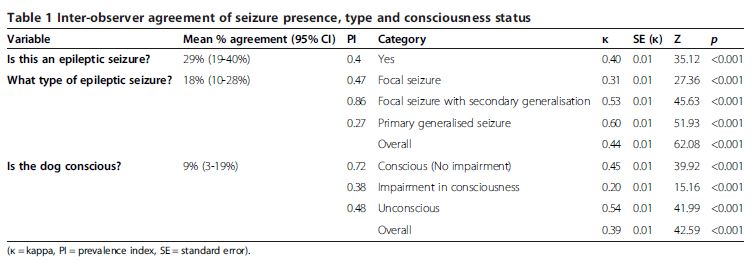The age of ubiquitous cell phone cameras is upon us, and it appears to be double-edged sword. On the one hand, moments historically understood to be private can, often without the participants’ permission, become worldwide entertainment. On the other hand, widespread video capability also has advantages. It may, for example, make it easier to catch the perpetrators of crimes. And in veterinary medicine, the ability to make videos of unusual and infrequent behaviors allows owners to more clearly show their vet what is happening with their pets, which may improve our ability to diagnose and treat some problems.
A recent study, the first of its kind, has begun the process of looking scientifically at the potential usefulness of one kind of video evidence often presented to vets– paroxysmal episodes which may be seizures, fainting spells, or other manifestations of disease.
Packer RMA, et al. Inter-observer agreement of canine and feline paroxysmal event semiology and classification by veterinary neurology specialists and non-specialists. BMC Veterinary Research (2015) 11:39.
The purpose of this study was to see if veterinarians, both neurology specialists and general practitioners, would agree on whether an event they saw on video was or was not a seizure. The study also looked in detail at agreement on specific ways of describing the events and at differences between specialists and non-specialists. There was no gold standard test to identify the right answer, so the purpose was not to see how well vets could identify seizures, but just to see if vets can even agree among themselves as to what is or is not a seizure. This is useful primarily in helping to refine and improve how we define and describe such events to make our diagnostic criteria better and our ability to use video evidence more accurate.
The image below shows some of the main data from this study.
The results found generally only fair agreement about whether an event witnessed was or was not a seizure. On average, there was only 29% agreement between observers for each video as to whether or not the event witnessed was a seizure. Agreement was even lower with respect to the type of seizure or whether the animal in the video had impairment of consciousness. Agreement was generally better about the presence or absence of specific motor movements.
Interestingly, specialists were less likely to classify an event as a seizure than non-specialists, possibly because they were better able to recognize unusual events that mimic seizures but that non-specialists don’t get to see very often.
Overall, the study shows us that we need to put in some work to improve how we characterize seizures and events that can resemble seizures so that we can have a consistent classification system for describing what we see in the videos our clients bring us and a better ability to incorporate this kind of evidence into our diagnostic process.
Here is what the authors of this study concluded:
In conclusion, this study has demonstrated that there were relatively low levels of agreement of seizure presence, type and semiologies reported by veterinary neurology specialists and non-specialists, highlighting the need for ongoing debate regarding the descriptive terminology used for seizure semiology in veterinary medicine, and the need for further training in focussed areas.
Although the use of videos to diagnose seizure activity may be increasingly common, the results presented here demonstrate that it should not be solely relied upon, with existing diagnostics always supplementing videos, and new diagnostics such as EEG more widely used for more objective, definitive diagnoses.











This was the only post regarding seizures I could find to lead into my question…
I have a 6 yr old Lab on Pheno (90 gr 2xday) for epilepsy; as well as 2 6mos old Lab pups. All 3 have just been prescribed Bravecto as we have a huge problem with ticks here. In your opinion, is this safe? I foolishly did a Google search and am now torn… Obviously my Vet believes in it; just looking for another point of view!
Thanks from Ottawa, Canada
There have been rare reports of seizures in dogs taking Bravecto, either orally or topically. These are uncommon enough that it hasn’t been possible to determine if there is a true causal relationship or just coincidence, since when lots of dogs have seizures and lots of dogs take Bravecto, some will inevitably have both. There is also hardly any veterinary drug on the market that you can’t search for on the Internet and find a list of anecdotes and testimonials claiming it has all sorts of deadly side effects. These are very rarely shown to be true, but of course you can’t scientifically prove the negative that they aren’t true.
So in balancing risks and benefits, you have to consider that if ticks are a problem in your area, tick-borne disease is a real risk. The available tick preventatives all appear to be very safe, based on the very small number of confirmed reports of adverse reactions compared to the large number of dogs using them, but no medicine ever has any benefit with zero risk. It is possible that Bravecto could induce seizures in a small proportion of dogs taking it. There is no evidence that dogs who already have epilepsy are at greater risk, but it is possible. Unfortunately, the same very small but hard to quantify risk of adverse effects applies to any other medication you might choose, so there is no perfect choice. Overall, I wouldn’t be very concerned about Bravecto in your situation, and I suspect the benefits would outweigh the risks. But there is always some uncertainty we have to live with in medicine.
Good Luck!
Thank you for giving me such a sensible answer! I was torn at the time but went with the Bravecto on my Vet’s advice – have had zero adverse reactions or seizures since.
Thanks again!